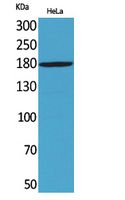
| WB | 咨询技术 | Human,Mouse,Rat |
| IF | 咨询技术 | Human,Mouse,Rat |
| IHC | 咨询技术 | Human,Mouse,Rat |
| ICC | 技术咨询 | Human,Mouse,Rat |
| FCM | 咨询技术 | Human,Mouse,Rat |
| Elisa | 1/20000 | Human,Mouse,Rat |
| Aliases | MRC2; CLEC13E; ENDO180; KIAA0709; UPARAP; C-type mannose receptor 2; C-type lectin domain family 13 member E; Endocytic receptor 180; Macrophage mannose receptor 2 |
| Entrez GeneID | 9902; |
| WB Predicted band size | 170kDa |
| Host/Isotype | Rabbit IgG |
| Antibody Type | Primary antibody |
| Storage | Store at 4°C short term. Aliquot and store at -20°C long term. Avoid freeze/thaw cycles. |
| Species Reactivity | Human,Mouse,Rat |
| Immunogen | Synthesized peptide derived from the Internal region of human Endo180. |
| Formulation | Purified antibody in PBS with 0.05% sodium azide,0.5%BSA and 50% glycerol. |
+ +
以下是关于Endo180抗体的3篇参考文献概览(文献名称、作者及摘要内容):
---
1. **"Endo180 binds to the C-terminal region of type I collagen"**
*Authors: Wienke D, et al.*
摘要:该研究通过开发特异性Endo180抗体,揭示了Endo180受体在细胞表面与I型胶原C端区域的直接结合,并证实其在胶原内吞和降解中的关键作用,为肿瘤基质重塑机制提供了新见解。
2. **"The C-type lectin receptor Endo180 displays a distinct glycosylation profile"**
*Authors: Sheikh H, et al.*
摘要:利用单克隆Endo180抗体进行免疫沉淀和质谱分析,发现Endo180在多种癌细胞系中具有独特的糖基化修饰模式,提示其糖基化可能调控受体活性和肿瘤侵袭性。
3. **"Targeting Endo180 in metastatic prostate cancer"**
*Authors: Hu J, et al.*
摘要:研究通过免疫组化(使用Endo180抗体)发现Endo180在前列腺癌转移灶中高表达,并证明其抗体偶联药物可靶向抑制肿瘤生长,为治疗转移性癌症提供潜在策略。
---
如需具体文献来源,建议通过PubMed或Google Scholar搜索上述标题及作者获取全文。
The Endo180 antibody targets the Endo180 receptor, also known as CD280 or MRC2. a transmembrane glycoprotein belonging to the mannose receptor family. Structurally, Endo180 contains an N-terminal cysteine-rich domain, a fibronectin type II repeat, and multiple C-type lectin-like domains, enabling its role in binding and internalizing extracellular matrix (ECM) components like collagen and glycosylated ligands. Primarily expressed on fibroblasts, endothelial cells, and certain cancer cells, Endo180 facilitates ECM remodeling, cell migration, and endocytic clearance of collagen, processes critical in tissue homeostasis and disease progression.
In cancer, Endo180 is implicated in tumor invasion and metastasis by promoting matrix degradation and cell motility. Its overexpression in malignancies like breast, prostate, and pancreatic cancer correlates with poor prognosis. Additionally, Endo180 participates in fibrosis by mediating collagen turnover in fibrotic tissues. Research using Endo180 antibodies focuses on detecting receptor expression, elucidating its mechanistic roles in pathophysiology, and exploring therapeutic potential. Neutralizing antibodies or ligand-blocking strategies are being investigated to inhibit tumor progression or fibrotic pathways. The antibody’s utility extends to diagnostic applications, where it aids in profiling tissue samples for disease biomarkers. Overall, Endo180 antibodies serve as vital tools in understanding and targeting ECM-mediated diseases.
×